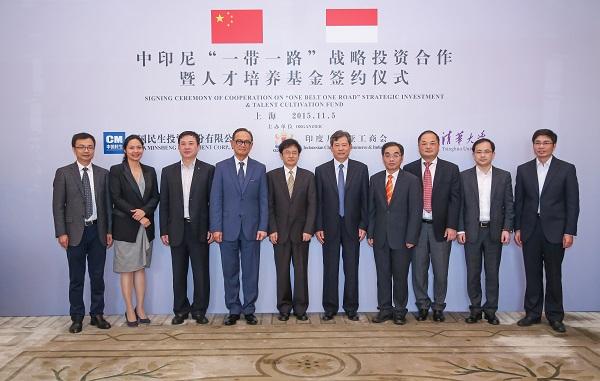"One Belt One Road" Talent Cultivation Program Established at Tsinghua University

The "One Belt One Road" Talent Cultivation Program was officially chartered at Tsinghua University on November 5, when China Minsheng Investment Corp., Ltd. (CMIG), the Indonesian Chamber of Commerce & Industry (KADIN) and Tsinghua University signed a cooperation agreement in Shanghai. Under the Agreement, CMIG's "One Belt One Road" Strategic Investment & Talent Cultivation Fund will contribute capital to entrust Tsinghua University to conduct a special plan of cultivating Indonesia-oriented business administration talents. This is the first-ever special talent cultivation plan funded by a private enterprise and conducted by a well-known Chinese university since the conception of the "One Belt One Road".
The implementation of the plan signifies that CMIG is comprehensively practicing the "One Belt One Road" development strategy and cultivating local talents in its overseas investments. In doing so, it will promote the integrated socio-economic development of the region along with the "One Belt One Road". Xu Huiming, vice chairman of the Shanghai Association of Industry and Commerce, Suryo Bambang Sulisto, chairman of the KADIN, CMIG President Li Huaizhen, and representatives from Tsinghua University and Peking University attended the Signing Ceremony.
CMIG's "One Belt One Road" Strategic Investment and Talent Cultivation Fund plans to invest a total of RMB100 million in 10 years. The contribution will be used to provide Chinese enterprises in the Indonesian Industrial Park with the support of localized talents. Undertaken by Tsinghua University, the first talent cultivation program -- "CMIG-Indonesian Industrial Park Tsinghua 'Pilot Program'", will be officially initiated in the Spring of 2016, and two sessions of well-targeted courses will be delivered each year. The focus of the program is to cultivate senior talented managers in market, operation, finance, IT and other fields. The first round of trainees, including 30-35 members, will be selected from the lists of persons recommended by CMIG and the KADIN. Upon the completion of the training, they will enjoy the preferential recommendations to work for the Indonesian Industrial Park project and other investment project companies of Chinese enterprises operating in Indonesia. The program is expected to deliver 20 sessions, training a total of 600-700 persons.

"The 'One Belt One Road' strategy not only brings about the export of Chinese capital and transfer of advantageous capacity, but also needs to be implemented comprehensively from the perspectives of talent exchanges and social development, thereby realizing the common development and prosperity of the region ultimately," CMIG President Li Huaizhen said at the Signing Ceremony, "this program is just our first stop, and more popular professional and technical training schemes are in the pipeline. CMIG will establish the CMIG industrial technology training program by partnering with advanced Chinese and Indonesian technical training institutions, with a view to provide a large number of skilled technicians for Chinese companies operating in the CMIG-Indonesian Industrial Park, and then meet the multi-layered talent demands of the Industrial Park."
Suryo Bambang Sulisto, chairman of the KADIN, believes that Indonesia is a populous nation, and to develop into an economic giant, Indonesian must address the talent issue. Further, the key point of talents lies in management staff. He was very supportive of the "One Belt One Road" Talent Cultivation Fund established by CMIG, saying that the KADIN will provide all-round supports for the implementation of the program and recommend the most excellent high potential talents to study in Tsinghua University.
Representatives from Tsinghua University present at the Ceremony noted that it is a great pleasure to enter into partnerships with leading Chinese and Indonesian companies and to produce high-caliber Indonesian business administration talents with Tsinghua's advantages in business administration education. This will enable Tsinghua to effectively participate in China's "One Belt One Road" strategy via training and education.
- CMIG Drawin: Promote Rapid Growth of Whole Industry Chain Business with Technological Advantages
- CMIG Futurelife’s Subsidiary Serves Beijing Daxing International Airport
- “Loving CMIG, Investing on the Future” Launching Ceremony held by CMIG
- CMIG is Awarded “Excellent Developer of Finance Shared Services of Chinese CFO 2018”
- The First Agreement on Comprehensive Cooperation Officially Signed between CMI and the Great Wall Assets
- Hana Financial Group Visited CMIG Subsidiary and Expressed Future Support
- CMIG joins hands with GWA MCC to build model for cooperation between state-owned financial institution and large-sized private enterprises
- Strong Combination Boosts Shandong's Driving Force Conversion
- Yang Xiaoping Assumes Post of Co-chairman of CMIG Board
- CMIG Hosts New Year Concert
- Liu Qiuming, President of CMIG Capital: Focus onSelf-Independent Enterprises in Weak-Cyclical Industry
- Steady Growth in Slumping Market, CMIG Jiaye Accelerates Strategy Adjustment by Two-Wheel Drive
- Graduate of Migrant School Received Offer from Harvard
- Integrating High-quality Properties, and Making Profits in Community Commerce. How will the “pillar” sector CMIG Futurelife operate in the future?
- Sirius Insurance, CMIG's subsidiary, goes public on Nasdaq
- China Minsheng bets on rural economy with 10 billion yuan investment fund
- CMIG’s New President Explains Development Strategies for the Future
- China Minsheng on Rural Economy Mission
- Agriculture Sector to Boom in China as Shelter for Global Investors
- CMIG International Out to Build World-class Financial Services Platform